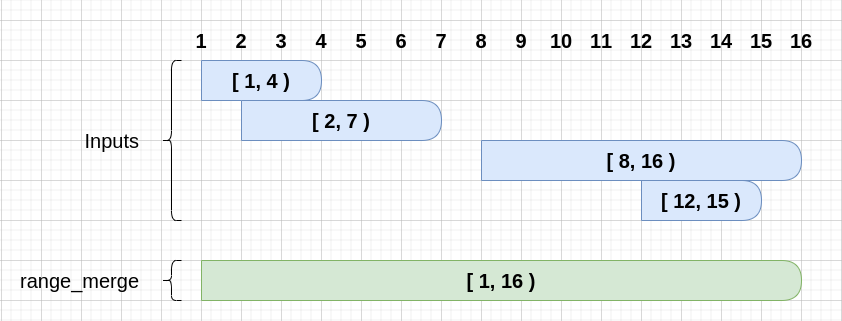A Django package that enables the PostgreSQL range_merge aggregate function for use with Django’s ORM.
django-range-merge provides access to PostgreSQL's range_merge aggregate function, which computes the smallest range that includes all input ranges. This is particularly useful when working with Django's range fields like DateTimeRangeField, DateRangeField, or IntegerRangeField.
This package should only be used with Django projects using the Postgres database. See Postgres docs on Range Functions.
Note: This app is still a work-in-progress, but currently works. Tests have not yet been implemented.
pip install django-range-mergeAdd to INSTALLED_APPS:
INSTALLED_APPS = [
...
"django_range_merge",
...
]Migrate to apply the aggregation to your database:
> python manage.py migrateHere is a quick example. We have an Event model with two different range fields: period, which contains the datetime range period during which the Event occurs; and potential_visitors, which is an approximation of the minimum and maximum number of people attending the Event.
We want two different views to help Event organizers understand some aggregate details about Events.
- range_of_visitors_this_month: Show the overall lowest and greatest number of people we expect for all events this month
- overall_dates_of_funded_events: Shows the overall range of dates for Events which are funded (the
is_fundedBooleanField is set to True)
models.py
class Event(models.Model):
name = models.TextField()
period = models.DateTimeRangeField()
potential_visitors = models.IntegerRangeField()
is_funded = BooleanField(default=False)
class Meta:
verbose_name = "Event"
verbose_name_plural = "Events"
def __str__(self):
return self.namedate_utils.py (get a range covering the entire current month)
from django.utils import timezone
from dateutil.relativedelta import relativedelta
from psycopg2.extras import DateTimeTZRange
def get_month_range():
"""Return a DateTimeRange range covering this entire month"""
today = timezone.now().date()
if today.day > 25:
today += timezone.timedelta(7)
this_month_start = today.replace(day=1)
next_month_start = this_month_start + relativedelta(months=1)
return DateTimeTZRange(this_month_start, next_month_start)views.py
from django.db.models import F, Aggregate
from django.template.response import TemplateResponse
from .date_utils import get_month_range
def range_of_visitors_this_month(request):
"""
e.g., given the following instances:
{"id" : 1, "name" : "Birthday", "potential_visitors" : "[2, 3)", ...}
{"id" : 2, "name" : "Bake Sale", "potential_visitors" : "[30, 50)", ...}
{"id" : 3, "name" : "Band Camp", "potential_visitors" : "[22, 28)", ...}
{"id" : 4, "name" : "Cooking Show", "potential_visitors" : "[7, 20)", ...}
{"id" : 5, "name" : "Pajama Day", "potential_visitors" : "[15, 30)", ...}
The result would be:
{'output': NumericRange(2, 50, '[)')}
"""
template = "base.html"
context = Event.objects.filter(period__overlap=get_month_range()).aggregate(
output=Aggregate(F("potential_visitors"), function="range_merge")
)
return TemplateResponse(request, template, context)
def overall_dates_of_funded_events(request):
template = "base.html"
context = Event.objects.filter(is_funded=True).aggregate(
output=Aggregate(F("period"), function="range_merge")
)
# Example result: {'output': DateTimeRange("2022-10-01 02:00:00", "2022-12-07 12:00:00", '[)')}
return TemplateResponse(request, template, context)base.html
<html>
<head></head>
<body>
{{ output }}
</body>
</html>- The
range_mergeaggregate operates efficiently on server side - Indexes on range fields can improve query performance
- Consider using
values()to limit data transfer when only ranges are needed
This project uses Docker Compose for development and testing. Follow these steps to get started:
- Make sure you have Docker and Docker Compose installed
- Install
uvtool:pip install uv
-
Clone the repository:
git clone https://github.com/OmenApps/django-range-merge.git cd django-range-merge -
Create a virtual environment and install dependencies:
uv venv source .venv/bin/activate # On Windows: .venv\Scripts\activate uv sync --prerelease=allow --extra=dev
-
Build and start the Docker containers:
docker-compose up -d --build postgres
-
Run migrations:
python manage.py migrate
Using nox:
nox -s testsThis will run tests across multiple Django versions.
The project uses PostgreSQL for testing. The Docker Compose setup includes a PostgreSQL instance with the following configuration:
- Host: localhost
- Port: 5436 # To avoid conflicts with local PostgreSQL installations
- Database: postgres
- Username: postgres
- Password: postgres
The database is automatically configured when running tests through Docker Compose.
The code in this repository is licensed under The MIT License. See LICENSE.md in the repository for more details.
Contributions are very welcome.
This project is currently accepting all types of contributions, bug fixes, security fixes, maintenance work, or new features. However, please make sure to have a discussion about your new feature idea with the maintainers prior to beginning development to maximize the chances of your change being accepted. You can start a conversation by creating a new issue on this repo summarizing your idea.
